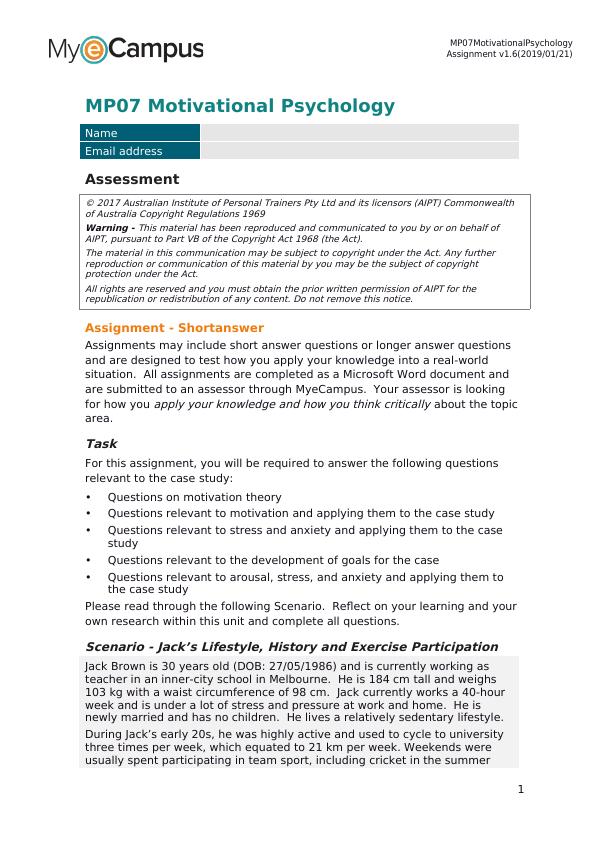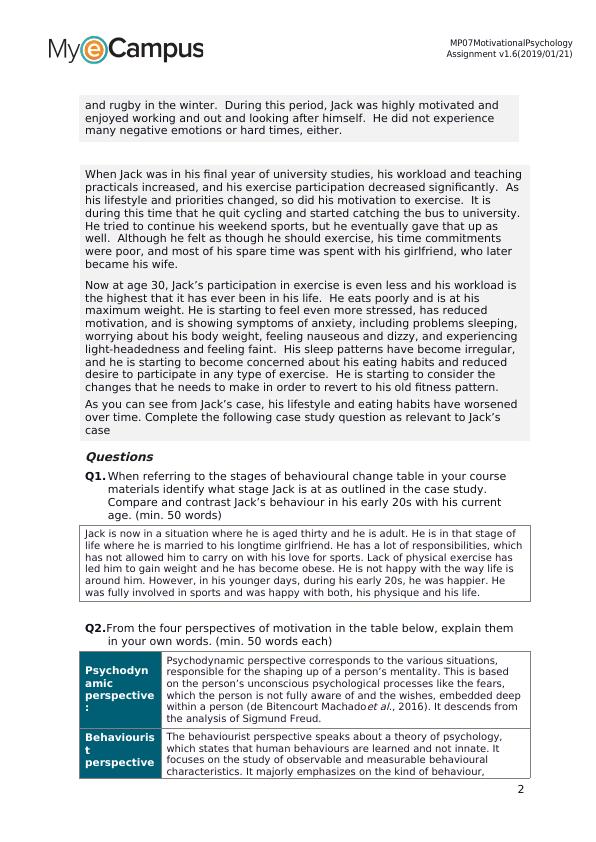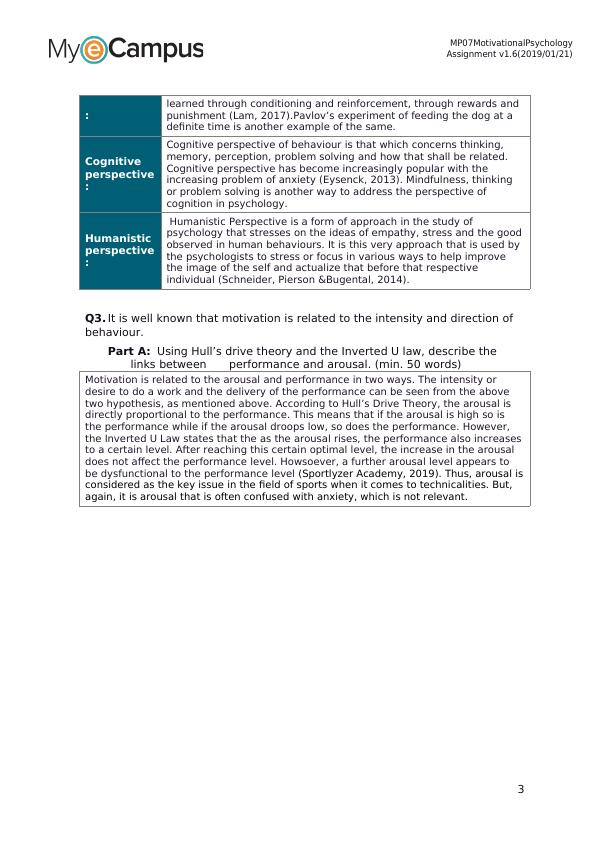MP07 Motivational Psychology Assignment - Desklib
Added on 2022-10-01
8 Pages3787 Words272 Views
MP07MotivationalPsychology
Assignment v1.6(2019/01/21)
MP07 Motivational Psychology
Name
Email address
Assessment© 2017 Australian Institute of Personal Trainers Pty Ltd and its licensors (AIPT) Commonwealth
of Australia Copyright Regulations 1969
Warning - This material has been reproduced and communicated to you by or on behalf of
AIPT, pursuant to Part VB of the Copyright Act 1968 (the Act).
The material in this communication may be subject to copyright under the Act. Any further
reproduction or communication of this material by you may be the subject of copyright
protection under the Act.
All rights are reserved and you must obtain the prior written permission of AIPT for the
republication or redistribution of any content. Do not remove this notice.
Assignment - Shortanswer
Assignments may include short answer questions or longer answer questions
and are designed to test how you apply your knowledge into a real-world
situation. All assignments are completed as a Microsoft Word document and
are submitted to an assessor through MyeCampus. Your assessor is looking
for how you
apply your knowledge and how you think critically about the topic
area.Task
For this assignment, you will be required to answer the following questions
relevant to the case study:
• Questions on motivation theory
• Questions relevant to motivation and applying them to the case study
• Questions relevant to stress and anxiety and applying them to the case
study
• Questions relevant to the development of goals for the case
• Questions relevant to arousal, stress, and anxiety and applying them to
the case study
Please read through the following Scenario. Reflect on your learning and your
own research within this unit and complete all questions.Scenario - Jack’s Lifestyle, History and Exercise Participation
Jack Brown is 30 years old (DOB: 27/05/1986) and is currently working as
teacher in an inner-city school in Melbourne. He is 184 cm tall and weighs
103 kg with a waist circumference of 98 cm. Jack currently works a 40-hour
week and is under a lot of stress and pressure at work and home. He is
newly married and has no children. He lives a relatively sedentary lifestyle.
During Jack’s early 20s, he was highly active and used to cycle to university
three times per week, which equated to 21 km per week. Weekends were
usually spent participating in team sport, including cricket in the summer
1
Assignment v1.6(2019/01/21)
MP07 Motivational Psychology
Name
Email address
Assessment© 2017 Australian Institute of Personal Trainers Pty Ltd and its licensors (AIPT) Commonwealth
of Australia Copyright Regulations 1969
Warning - This material has been reproduced and communicated to you by or on behalf of
AIPT, pursuant to Part VB of the Copyright Act 1968 (the Act).
The material in this communication may be subject to copyright under the Act. Any further
reproduction or communication of this material by you may be the subject of copyright
protection under the Act.
All rights are reserved and you must obtain the prior written permission of AIPT for the
republication or redistribution of any content. Do not remove this notice.
Assignment - Shortanswer
Assignments may include short answer questions or longer answer questions
and are designed to test how you apply your knowledge into a real-world
situation. All assignments are completed as a Microsoft Word document and
are submitted to an assessor through MyeCampus. Your assessor is looking
for how you
apply your knowledge and how you think critically about the topic
area.Task
For this assignment, you will be required to answer the following questions
relevant to the case study:
• Questions on motivation theory
• Questions relevant to motivation and applying them to the case study
• Questions relevant to stress and anxiety and applying them to the case
study
• Questions relevant to the development of goals for the case
• Questions relevant to arousal, stress, and anxiety and applying them to
the case study
Please read through the following Scenario. Reflect on your learning and your
own research within this unit and complete all questions.Scenario - Jack’s Lifestyle, History and Exercise Participation
Jack Brown is 30 years old (DOB: 27/05/1986) and is currently working as
teacher in an inner-city school in Melbourne. He is 184 cm tall and weighs
103 kg with a waist circumference of 98 cm. Jack currently works a 40-hour
week and is under a lot of stress and pressure at work and home. He is
newly married and has no children. He lives a relatively sedentary lifestyle.
During Jack’s early 20s, he was highly active and used to cycle to university
three times per week, which equated to 21 km per week. Weekends were
usually spent participating in team sport, including cricket in the summer
1

MP07MotivationalPsychology
Assignment v1.6(2019/01/21)
and rugby in the winter. During this period, Jack was highly motivated and
enjoyed working and out and looking after himself. He did not experience
many negative emotions or hard times, either.
When Jack was in his final year of university studies, his workload and teaching
practicals increased, and his exercise participation decreased significantly. As
his lifestyle and priorities changed, so did his motivation to exercise. It is
during this time that he quit cycling and started catching the bus to university.
He tried to continue his weekend sports, but he eventually gave that up as
well. Although he felt as though he should exercise, his time commitments
were poor, and most of his spare time was spent with his girlfriend, who later
became his wife.
Now at age 30, Jack’s participation in exercise is even less and his workload is
the highest that it has ever been in his life. He eats poorly and is at his
maximum weight. He is starting to feel even more stressed, has reduced
motivation, and is showing symptoms of anxiety, including problems sleeping,
worrying about his body weight, feeling nauseous and dizzy, and experiencing
light-headedness and feeling faint. His sleep patterns have become irregular,
and he is starting to become concerned about his eating habits and reduced
desire to participate in any type of exercise. He is starting to consider the
changes that he needs to make in order to revert to his old fitness pattern.
As you can see from Jack’s case, his lifestyle and eating habits have worsened
over time. Complete the following case study question as relevant to Jack’s
caseQuestions
Q1. When referring to the stages of behavioural change table in your course
materials identify what stage Jack is at as outlined in the case study.
Compare and contrast Jack’s behaviour in his early 20s with his current
age. (min. 50 words)
Jack is now in a situation where he is aged thirty and he is adult. He is in that stage of
life where he is married to his longtime girlfriend. He has a lot of responsibilities, which
has not allowed him to carry on with his love for sports. Lack of physical exercise has
led him to gain weight and he has become obese. He is not happy with the way life is
around him. However, in his younger days, during his early 20s, he was happier. He
was fully involved in sports and was happy with both, his physique and his life.
Q2.From the four perspectives of motivation in the table below, explain them
in your own words. (min. 50 words each)
Psychodyn
amic
perspective
:
Psychodynamic perspective corresponds to the various situations,
responsible for the shaping up of a person’s mentality. This is based
on the person’s unconscious psychological processes like the fears,
which the person is not fully aware of and the wishes, embedded deep
within a person (de Bitencourt Machado
et al., 2016). It descends from
the analysis of Sigmund Freud.
Behaviouris
t
perspective
The behaviourist perspective speaks about a theory of psychology,
which states that human behaviours are learned and not innate. It
focuses on the study of observable and measurable behavioural
characteristics. It majorly emphasizes on the kind of behaviour,
2
Assignment v1.6(2019/01/21)
and rugby in the winter. During this period, Jack was highly motivated and
enjoyed working and out and looking after himself. He did not experience
many negative emotions or hard times, either.
When Jack was in his final year of university studies, his workload and teaching
practicals increased, and his exercise participation decreased significantly. As
his lifestyle and priorities changed, so did his motivation to exercise. It is
during this time that he quit cycling and started catching the bus to university.
He tried to continue his weekend sports, but he eventually gave that up as
well. Although he felt as though he should exercise, his time commitments
were poor, and most of his spare time was spent with his girlfriend, who later
became his wife.
Now at age 30, Jack’s participation in exercise is even less and his workload is
the highest that it has ever been in his life. He eats poorly and is at his
maximum weight. He is starting to feel even more stressed, has reduced
motivation, and is showing symptoms of anxiety, including problems sleeping,
worrying about his body weight, feeling nauseous and dizzy, and experiencing
light-headedness and feeling faint. His sleep patterns have become irregular,
and he is starting to become concerned about his eating habits and reduced
desire to participate in any type of exercise. He is starting to consider the
changes that he needs to make in order to revert to his old fitness pattern.
As you can see from Jack’s case, his lifestyle and eating habits have worsened
over time. Complete the following case study question as relevant to Jack’s
caseQuestions
Q1. When referring to the stages of behavioural change table in your course
materials identify what stage Jack is at as outlined in the case study.
Compare and contrast Jack’s behaviour in his early 20s with his current
age. (min. 50 words)
Jack is now in a situation where he is aged thirty and he is adult. He is in that stage of
life where he is married to his longtime girlfriend. He has a lot of responsibilities, which
has not allowed him to carry on with his love for sports. Lack of physical exercise has
led him to gain weight and he has become obese. He is not happy with the way life is
around him. However, in his younger days, during his early 20s, he was happier. He
was fully involved in sports and was happy with both, his physique and his life.
Q2.From the four perspectives of motivation in the table below, explain them
in your own words. (min. 50 words each)
Psychodyn
amic
perspective
:
Psychodynamic perspective corresponds to the various situations,
responsible for the shaping up of a person’s mentality. This is based
on the person’s unconscious psychological processes like the fears,
which the person is not fully aware of and the wishes, embedded deep
within a person (de Bitencourt Machado
et al., 2016). It descends from
the analysis of Sigmund Freud.
Behaviouris
t
perspective
The behaviourist perspective speaks about a theory of psychology,
which states that human behaviours are learned and not innate. It
focuses on the study of observable and measurable behavioural
characteristics. It majorly emphasizes on the kind of behaviour,
2

MP07MotivationalPsychology
Assignment v1.6(2019/01/21)
:
learned through conditioning and reinforcement, through rewards and
punishment (Lam, 2017).Pavlov’s experiment of feeding the dog at a
definite time is another example of the same.
Cognitive
perspective
:
Cognitive perspective of behaviour is that which concerns thinking,
memory, perception, problem solving and how that shall be related.
Cognitive perspective has become increasingly popular with the
increasing problem of anxiety (Eysenck, 2013). Mindfulness, thinking
or problem solving is another way to address the perspective of
cognition in psychology.
Humanistic
perspective
:
Humanistic Perspective is a form of approach in the study of
psychology that stresses on the ideas of empathy, stress and the good
observed in human behaviours. It is this very approach that is used by
the psychologists to stress or focus in various ways to help improve
the image of the self and actualize that before that respective
individual (Schneider, Pierson &Bugental, 2014).
Q3. It is well known that motivation is related to the intensity and direction of
behaviour.
Part A: Using Hull’s drive theory and the Inverted U law, describe the
links between performance and arousal. (min. 50 words)
Motivation is related to the arousal and performance in two ways. The intensity or
desire to do a work and the delivery of the performance can be seen from the above
two hypothesis, as mentioned above. According to Hull’s Drive Theory, the arousal is
directly proportional to the performance. This means that if the arousal is high so is
the performance while if the arousal droops low, so does the performance. However,
the Inverted U Law states that the as the arousal rises, the performance also increases
to a certain level. After reaching this certain optimal level, the increase in the arousal
does not affect the performance level. Howsoever, a further arousal level appears to
be dysfunctional to the performance level (Sportlyzer Academy, 2019). Thus, arousal is
considered as the key issue in the field of sports when it comes to technicalities. But,
again, it is arousal that is often confused with anxiety, which is not relevant.
3
Assignment v1.6(2019/01/21)
:
learned through conditioning and reinforcement, through rewards and
punishment (Lam, 2017).Pavlov’s experiment of feeding the dog at a
definite time is another example of the same.
Cognitive
perspective
:
Cognitive perspective of behaviour is that which concerns thinking,
memory, perception, problem solving and how that shall be related.
Cognitive perspective has become increasingly popular with the
increasing problem of anxiety (Eysenck, 2013). Mindfulness, thinking
or problem solving is another way to address the perspective of
cognition in psychology.
Humanistic
perspective
:
Humanistic Perspective is a form of approach in the study of
psychology that stresses on the ideas of empathy, stress and the good
observed in human behaviours. It is this very approach that is used by
the psychologists to stress or focus in various ways to help improve
the image of the self and actualize that before that respective
individual (Schneider, Pierson &Bugental, 2014).
Q3. It is well known that motivation is related to the intensity and direction of
behaviour.
Part A: Using Hull’s drive theory and the Inverted U law, describe the
links between performance and arousal. (min. 50 words)
Motivation is related to the arousal and performance in two ways. The intensity or
desire to do a work and the delivery of the performance can be seen from the above
two hypothesis, as mentioned above. According to Hull’s Drive Theory, the arousal is
directly proportional to the performance. This means that if the arousal is high so is
the performance while if the arousal droops low, so does the performance. However,
the Inverted U Law states that the as the arousal rises, the performance also increases
to a certain level. After reaching this certain optimal level, the increase in the arousal
does not affect the performance level. Howsoever, a further arousal level appears to
be dysfunctional to the performance level (Sportlyzer Academy, 2019). Thus, arousal is
considered as the key issue in the field of sports when it comes to technicalities. But,
again, it is arousal that is often confused with anxiety, which is not relevant.
3

End of preview
Want to access all the pages? Upload your documents or become a member.
Related Documents
CLD13 Exercise for Childrenlg...
|5
|1583
|425
NUT06 Nutrition: Case Studies Analysis and Dietary Recommendationslg...
|7
|2657
|460
NUT06 Nutrition Assignment (Doc)lg...
|9
|4732
|515
YNG10 Exercise for the young - Assignment v1.2 (2018/10/23)lg...
|11
|2942
|199
Document Related to Personal Traininglg...
|30
|8692
|54
YNG10 Exercise for the Young: Case Studies, Assessments, and Exercise Programslg...
|9
|2729
|386
